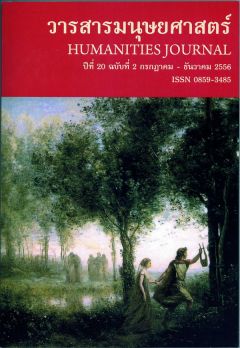A Study of Non-Observance of Grice’s Cooperative Principle Found in Humor Discourse: A Case Analysis of the Situation Comedy The Big Bang Theory
Main Article Content
Abstract
The purposes of this qualitative study were to investigate the types of non-observance of Grice’s Cooperative Principle employed in humor discourse of the sitcom entitled The Big Bang Theory and to explore the rhetorical techniques that are used to help non-observance of the Cooperative Principle provoke the sense of humor in the dialogue of the series. The theoretical frameworks are applied using Thomas (1995) and Berger’s inventories of the rhetorical categories (1990). The data of this study was based on the texts of subtitle collected from the American comedy series The Big Bang Theory from the third season. The
investigation concentrated on the parts of the text that receives a humorous effect; namely, soundtrack laughter.
The findings revealed that various means of non-observance of the Cooperative Principle maxims had contributed to humor generation in which flouting was the most frequently used type by occurring 117 times (66.86%) throughout the series. Repartee was the rhetorical technique employed the most by characters with 24 times (16.22%) to interchange a witty reply during interlocution in the series. In sum, the results reveal that the rhetorical techniques of humor are used to complement the types of non-observance to the study by rendering a reason for the cause of humor.


